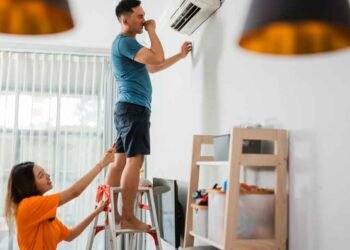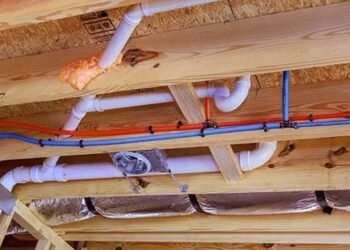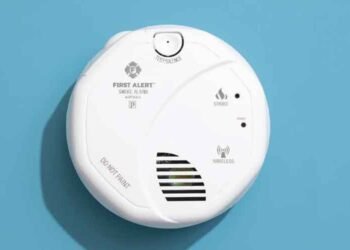What is the one place that always comes to your mind when you hear the words comfort, peace, and security? Your home, right? However, without regular inspections and maintenance, even the most inviting homes can quickly become uncomfortable and costly to maintain. Therefore, it is important to conduct routine inspections to identify potential problems before they become major issues and turn your comfort zone into a hazardous place. All you need to do is focus on key areas each year to ensure your homes remain safe, efficient, and in good condition.
This article will guide you through the top eight home inspections to carry out annually for a comfortable and safe home.
1. Roof Inspection
A roof is one of the most critical components of a home, shielding it from the elements and helping to maintain structural integrity. An annual roof inspection is essential to prevent leaks, water damage, and other costly repairs. Homeowners should look for missing, damaged, or curling shingles, which can expose the underlying layers to moisture and wind.
Checking for debris buildup in gutters and downspouts is also crucial, as clogs can lead to water overflow and potential damage to the roof and foundation. Hiring a professional roofer for an in-depth examination can provide peace of mind and ensure that any issues are identified and addressed promptly.
2. HVAC System Inspection
The HVAC system plays a vital role in maintaining a comfortable indoor environment year-round. An annual inspection of your heating, ventilation, and air conditioning system can help detect issues before they become costly repairs. Common signs that an HVAC system may need attention include strange noises, inconsistent temperatures, or unusual odors. These symptoms may indicate problems like worn-out components, leaks in ductwork, or blockages that reduce system efficiency.
It is essential to hire professional heating and air conditioning repair services to handle any repairs or replacements, as they have the necessary skills and tools to ensure the job is done correctly. Professionals can also provide routine maintenance, such as cleaning or replacing filters and checking refrigerant levels, which can further improve system performance and energy efficiency.
3. Plumbing Inspection
A well-maintained plumbing system can prevent water damage and avoid expensive repairs. An annual plumbing inspection involves checking for leaks, signs of corrosion, and issues with water pressure. Homeowners should inspect visible pipes for any signs of wear or damage, such as rust or leaks around joints and connections. Additionally, faucets, showers, and toilets should be checked for drips or leaks, which can lead to higher water bills and potential water damage over time.
Examining drains for proper flow and clearing any clogs can prevent backups that may cause damage to floors and walls. Inspecting the water heater for signs of rust or leaks and checking the pressure relief valve for proper operation are also important steps.
4. Electrical System Inspection
Neglecting your electrical system can lead to major problems, including fire hazards. Inspections are necessary to make sure the system remains safe and up to code. An annual check should involve inspecting circuit breakers, outlets, and wiring for any signs of wear or damage. Look for loose outlets, frayed wires, or burnt smells near electrical fixtures, which could indicate faulty wiring or overloaded circuits.
Testing all outlets and ensuring they are properly grounded can prevent electrical shocks and reduce the risk of fire. If any issues are found, immediately hire a licensed electrician to handle repairs, as they have the expertise to safely address electrical problems.
5. Pest Inspection
Pests such as termites, rodents, ants, and other insects can silently invade a home, often going unnoticed until the damage is severe. A thorough annual pest inspection can help identify the early signs of an infestation, such as droppings, nests, or damage to wooden structures.
Termites, in particular, are notorious for causing extensive damage to wood framing, floors, and other wooden components. An inspector will check for mud tubes, discarded wings, and hollow-sounding wood, all indicators of a termite presence. Rodents, like rats and mice, can chew through electrical wiring, insulation, and wood, leading to potential fire hazards and structural damage. Regular pest inspections, preferably conducted by a professional pest control service, can help homeowners detect and eliminate these threats early, maintaining a safe and pest-free environment.
6. Exterior Inspection
Besides the roof, an inspection of your home’s overall exterior is essential to protect your beloved home against weather-related damage. An annual exterior inspection helps ensure that the siding, windows, doors, and gutters are in good condition and free from damage. Checking the siding for cracks, warping, or signs of water intrusion can prevent moisture from seeping into the home, which can cause mold growth and structural damage.
Windows and doors should be inspected for broken seals, gaps, or damaged frames that could allow drafts and moisture to enter the home. Ensuring that gutters and downspouts are clear of debris and functioning properly is also vital to prevent water damage to the roof and foundation. Regular maintenance of the home’s exterior not only preserves its appearance but also protects it from the elements, extending the lifespan of its components.
7. Appliance Inspection
Home appliances, such as water heaters, washing machines, refrigerators, and stoves, play a significant role in daily life and require regular inspections to ensure they operate efficiently and safely. An annual appliance inspection can help identify signs of wear and tear, such as leaks, unusual noises, or erratic performance. For example, inspecting a water heater for signs of rust or sediment buildup can prevent unexpected failures and potential water damage.
Similarly, checking washing machines and dishwashers for leaks or worn hoses can prevent water damage and extend the appliances’ lifespan. Regularly cleaning refrigerator coils can improve energy efficiency and reduce the risk of breakdowns. Maintaining these appliances ensures that they continue to function correctly, reducing the likelihood of inconvenient and costly repairs or replacements.
8. Safety and Security Inspection
A home should always be a safe haven, and an annual safety and security inspection is crucial to ensure it remains so. Testing smoke detectors and carbon monoxide detectors is critical to ensure they function correctly and provide early warnings in the event of a fire or gas leak. Batteries should be replaced regularly, and detectors should be tested monthly.
Home security systems, including alarms, cameras, and locks, should be checked to see if they are working properly. Regularly updating and testing these systems can provide peace of mind, knowing that your home is secure and well-prepared for emergencies.
Regular home inspections are not just about maintaining property value; they are about safeguarding the well-being and comfort of everyone who lives there. By committing to an annual inspection routine, homeowners can be at peace, knowing their homes are not only well-maintained but also prepared to offer safety, comfort, and efficiency in every season. This ongoing diligence transforms a house into a true home—a place where you can live worry-free, confident that your living space is in its best condition.












